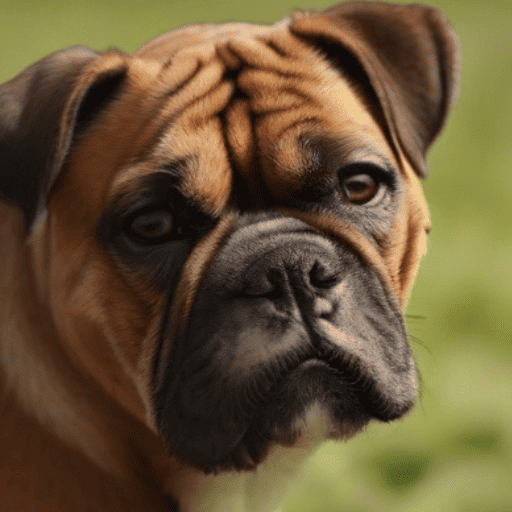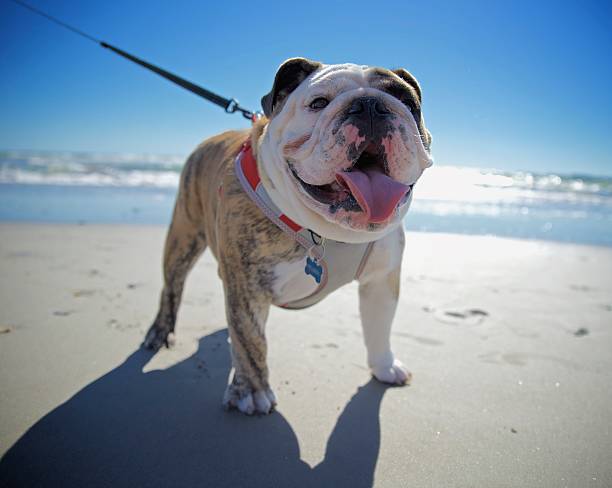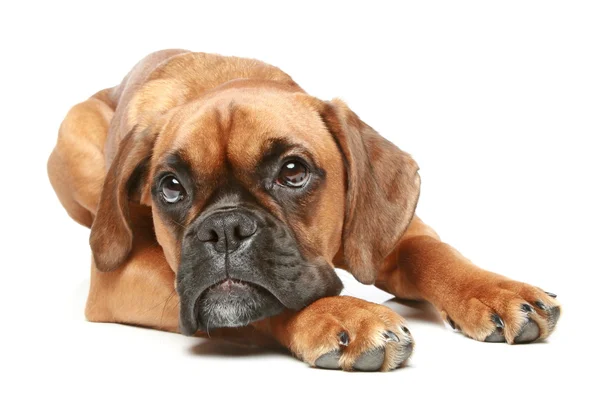The Leavitt Bulldog, an embodiment of intelligence, loyalty, and versatile spirit, resonates deeply with those who value a loyal and adaptable companion. With its sturdy build, playful temperament, and unmatched devotion, this breed has firmly established itself as a cherished family member and a testament to the enduring spirit of bulldog breeds.

| Category (Explanation) | Breed Information |
|---|---|
| Year of Breed Conception | 1970s |
| Country of Origin | United States |
| Weight (Male) | 65-80 lbs (29-36 kg) |
| Weight (Female) | 55-70 lbs (25-32 kg) |
| Coat Type | Short, smooth |
| Color Variations | Brindle, white, or fawn |
| Shedding Level | Low to moderate |
| Height (cm & in) | 51-61 cm (20-24 inches) |
| Breed Size | Medium |
| Trainability | Moderate |
| Mental Needs | Moderate |
| Intelligence Level | Moderate |
| Energy Level | Moderate to high |
| Agility | Moderate |
| Loyalty | High |
| Playfulness | Moderate to high |
| Exercise Needs | Regular exercise and play |
| Guarding Proficiency | Moderate |
| Sociability with Children | High |
| Barking Level | Low to moderate |
| Digging Tendency | Low |
| Destructive Behavior | Low |
| Drooling Level | Low to moderate |
| Obedience Level | Moderate |
| Apartment Friendly | Yes, with proper exercise and space |
| Inherent Prey Drive | Moderate |
| Physical Risk to Others | Low to moderate |
| Travel Fatality Risk | Low |
| Allergen Potential | Low (considered hypoallergenic) |
| Health Concerns | Hip dysplasia, joint issues |
| Average Life Expectancy | 10-12 years |










































































Woof Mastery is reader supported and our articles may contain affiliate links.
Instead of running third party ads that we have no control of we only use links from high-quality companies we are directly partnered with. Making use of these links come at no cost to you our reader, and in many cases have the extra benefit of discounted rates or sign up bonuses.
If you’re interested you can read more about our affiliate policy here.
We appreciate your support and always insure that the products and services we recommend are high-quality, helpful and relevant to the subject at hand!
The Leavitt Bulldog’s history is a tribute to the breed’s development in the late 20th century. Bred by David Leavitt, these dogs are a deliberate mix of the Old English Bulldog, American Bulldog, Bullmastiff, and American Pit Bull Terrier. The goal was to create a healthier and more athletic bulldog while preserving the breed’s distinctive appearance and temperament.
The journey from various bulldog breeds to the recognized Leavitt Bulldog showcases their adaptability and the commitment to creating a robust and friendly companion.
Today, Leavitt Bulldogs are celebrated for their strength, loyalty, and their role as a testament to modern breeding practices and dedication to canine health.

What sets the Leavitt Bulldog apart is its special focus on improving the health and vitality of the traditional bulldog. These dogs have a muscular build and a distinctive appearance akin to classic bulldogs.
Leavitt Bulldogs are known for their affectionate and friendly nature. They balance their traditional looks with better health, which includes fewer breed-related health issues.
Their dedication to preserving bulldog qualities while promoting health and well-being makes them special to those who value both tradition and the overall well-being of their canine companions. Leavitt Bulldogs offer the charm of classic bulldogs with the added benefit of improved health and vitality, making them truly special pets.
The traditional role of the Leavitt Bulldog included working as versatile farm dogs, assisting with tasks such as herding and guarding. They excelled in agility and strength, contributing to the success of various agricultural activities. Today, they continue to thrive as affectionate family pets, offering both companionship and a touch of athleticism to their owners.
Leavitt Bulldogs are renowned for their gentle and affectionate personalities. They exhibit a calm and loving disposition that extends to their interactions with children, making them excellent family pets.
Their intelligence and eagerness to please make them trainable and adaptable companions. Leavitt Bulldogs may be initially reserved around strangers, but their devotion to their families is unwavering.
They embody confidence, courage, and a strong sense of duty, making them not only dependable pets but also soothing and loving presences in their households.
Leavitt Bulldogs are known for their gentle and affectionate temperament. They exhibit a calm and loving disposition that extends to their interactions with children, making them excellent family pets.
Their intelligence and eagerness to please make them trainable and adaptable companions. Leavitt Bulldogs may be initially reserved around strangers, but their devotion to their families is unwavering.
They embody confidence, courage, and a strong sense of duty, making them not only dependable pets but also soothing and loving presences in their households. Effective training and socialization are essential for fostering a well-adjusted temperament in this breed.
Leavitt Bulldogs are medium-sized dogs known for their muscular, athletic build and expressive features. Their square-shaped head features a well-defined jaw that adds to their striking and determined appearance.
Their medium-sized, expressive eyes typically come in shades of brown, reflecting their loyalty and affection. Ears are medium-sized and naturally fold forward, contributing to their endearing expression.
These dogs have a short, smooth coat that comes in various colors, often with white markings. Their skin is thick and slightly loose, especially around the neck, creating a lovable and endearing wrinkled appearance.
The neck is powerful and well-muscled, leading to a broad chest and sturdy, straight legs, ensuring agility and strength. The tail is straight and tapered, adding to their balanced and harmonious physique.
In terms of size, males stand around 20-24 inches (51-61 cm) at the shoulder, and females are slightly smaller. Weight ranges from 65 to 85 pounds (29-39 kg) for males and slightly less for females. Leavitt Bulldogs possess an appearance that reflects their athleticism, loyalty, and friendly demeanor, making them devoted and affectionate companions.
Overall, Leavitt Bulldog have well-proportioned and agile bodies, stemming from their roles as versatile working dogs. Their appearance exudes strength, confidence, and athleticism, with males often displaying a more robust and imposing presence compared to females. This emphasizes their historical significance on farms and as devoted companions.
Leavitt Bulldogs, created by breeding Olde English Bulldogs and American Bulldogs, have a strong and muscular appearance with color varieties that highlight their athleticism. The most common color variations include:
Leavitt Bulldogs often have a low shedding level. They are not considered heavy shedders, and their shedding is typically minimal year-round. Occasional grooming and brushing with a soft bristle brush can help manage shedding and maintain their coat’s health.
Factors affecting shedding in Leavitt Bulldogs include genetics, overall health, and diet. Regular exercise and a well-balanced diet contribute to coat health and may reduce shedding. Providing a stress-free environment can help minimize stress-related shedding.
Leavitt Bulldogs, a revitalized version of the Old English Bulldog, have a coat that’s both resilient and requires routine care.
Brushing: Using a rubber grooming mitt, followed by a firm bristle brush, on a weekly basis, can manage shedding and ensure a lustrous coat.
Bathing: Their sturdy disposition might demand a monthly bath, especially if they’ve been on outdoor adventures. A gentle dog shampoo, followed by a hydrating conditioner, can keep their coat in top condition.
Ears: Their ears, being moderately floppy, can often trap moisture. Regular checks, combined with a weekly cleaning using a mild solution, are crucial.
Nails: Their nails, if unchecked, can grow rapidly. Bi-weekly trims, complemented by occasional nail filing, ensure their agility remains uncompromised.
Teeth: Their strong jaws demand optimal dental care. Daily brushing, dental chews, and regular vet checks can be beneficial.
Wrinkle Care: The breed’s wrinkles, predominantly around the face, demand regular cleaning. Ensuring they remain dry is essential.
Eye Care: Regular checks, combined with weekly cleanings using a soft cloth, ensure their eyes remain in pristine condition.
Leavitt Bulldogs have a moderate activity level. They are known for their affectionate and loyal nature. Here are some key points to consider about their activity level:
Leavitt Bulldogs are a breed that showcase a moderate level of intelligence, marked by adaptability, problem-solving skills, and a strong desire to please its owners. Here are key characteristics that highlight its intelligence:
Although not the most clever, this breed excels as both a working dog and a loving family companion. Training, socialization, and mental stimulation are essential to help it reach its full potential.
Leavitt Bulldogs value cognitive tasks. Choose challenging toys, obedience training, or two-player games.
Social Interaction: Leavitt Bulldogs, with their friendly nature, need daily human touch. Loneliness can lead to behavioral issues.
Exercise: Leavitt Bulldogs need daily workouts to maintain their robust physique and ensure mental balance.
Training and Obedience: Leavitt Bulldogs, being intelligent, benefit greatly from obedience training. Positive, gentle methods are always preferred.
Routine and Structure: Leavitt Bulldogs flourish when there’s a defined routine. It provides a sense of security and stability in their lives.
Affection and Attention: Leavitt Bulldogs, known for their amiable nature, value human affection deeply. Allocate regular bonding sessions with them.
Socialization: Early and positive socialization is pivotal for Leavitt Bulldogs. Introduce them to diverse settings and experiences from a young age.
Safe Environment: Leavitt Bulldogs thrive when they have a serene, safe space in the house. It’s essential for their relaxation and mental peace.
Consistency: Consistency in daily rituals and commands imparts a sense of security to Leavitt Bulldogs. It’s vital for their well-being.
Enter The Woof Mastery

Before bringing a Leavitt Bulldog into your home, it’s crucial to recognize their needs. These dogs are known for their gentle and friendly nature. They require regular exercise and mental stimulation to maintain their well-being. Training and socialization are important to ensure they are well-behaved.
Be prepared for potential health concerns specific to the breed, including skin allergies. Responsible ownership includes providing love, attention, and a safe environment for these loyal and affectionate companions.
Leavitt Bulldogs, known for their friendly and outgoing nature, typically pose a lower potential physical danger to others compared to more aggressive breeds. Nevertheless, a dog’s behavior depends on factors such as individual temperament, upbringing, training, and owner responsibility. Here are some considerations regarding their potential physical danger:
Leavitt Bulldogs are renowned for their gentle and affectionate personalities. They exhibit a calm and loving disposition that extends to their interactions with children, making them excellent family pets.
Their intelligence and eagerness to please make them trainable and adaptable companions. Leavitt Bulldogs may be initially reserved around strangers, but their devotion to their families is unwavering.
They embody confidence, courage, and a strong sense of duty, making them not only dependable pets but also soothing and loving presences in their households.
Leavitt Bulldogs, developed as a recreation of the healthier bulldogs of the past, have specific attributes impacting their swimming capabilities. Here’s what to consider:
While many Leavitt Bulldogs can potentially swim and enjoy water-based activities, always be attentive to their reactions and prioritize safety.
Leavitt Bulldogs, celebrated for their athletic prowess and amiable temperament, often use vocalizations to communicate their needs and feelings. Here are some common noises they may make:
Leavitt Bulldog owners should pay attention to these vocalizations and understand the context in which they occur. While many of these sounds are a part of their charming nature, others may signal a desire for interaction or companionship. Positive reinforcement training can assist in managing and adapting their vocal behaviors.
Leavitt Bulldogs thrive in homes where they receive love, structure, and opportunities for socialization. Here are some ideal living conditions for Leavitt Bulldogs:
Challenges:
When it comes to travel fatality risk for Leavitt Bulldogs, consider the following potential constraints:
By addressing these potential constraints and taking necessary precautions, you can help ensure the safe travel of your Leavitt Bulldog and minimize travel-related risks.
Leavitt Bulldogs may be prone to specific health concerns. While not all individuals will experience these issues, it’s essential for Leavitt Bulldog owners to be aware of potential health problems and work with veterinarians to maintain their pets’ well-being. Common health concerns in Leavitt Bulldogs include:
Regular veterinary check-ups, a balanced diet, proper exercise, and responsible breeding practices can help mitigate some of these health concerns. It’s crucial for Leavitt Bulldog owners to work closely with their veterinarians to monitor their pets’ health and address any issues promptly.
Optimal nutrition is pivotal for the overall health and longevity of Leavitt Bulldogs. Below are dietary guidelines and practices to keep in mind for this particular breed:
Breed-Specific Laws (BSL): Leavitt Bulldogs, being a recreation of the Old English Bulldog, might face breed-specific laws (BSL) in some areas. These laws are typically established at the local or municipal level, with variations across jurisdictions.
Types of Restrictions: BSL related to Leavitt Bulldogs might include mandatory spaying/neutering, unique licensing, liability insurance criteria, public muzzling requirements, and in specific cases, ownership bans. The intricacies of these restrictions are often region-centric.
Rationale for BSL: The instatement of BSL often stems from safety concerns associated with specific breeds. While Leavitt Bulldogs are known for their balanced temperament, their bulldog association might make them subject to BSL.
Controversy: The debate around BSL is continuous, with a sizable segment believing that breed-specific laws might not be the most effective solution, emphasizing responsible pet ownership instead.
Local Regulations: Aspiring Leavitt Bulldog owners should be vigilant about local breed-specific laws by liaising with local animal control or administrative entities.
Woof Mastery is reader supported and our articles may contain affiliate links.
Instead of running third party ads that we have no control of we only use links from high-quality companies we are directly partnered with. Making use of these links come at no cost to you our reader, and in many cases have the extra benefit of discounted rates or sign up bonuses.
If you’re interested you can read more about our affiliate policy here.
We appreciate your support and always insure that the products and services we recommend are high-quality, helpful and relevant to the subject at hand!
Myth 1: Leavitt Bulldogs are Aggressive by Nature
Myth 2: They are High-Energy Dogs
Myth 3: They Can’t Tolerate Cold Weather
Myth 4: They are Not Good with Children
Myth 5: They Shed Excessively
Myth 6: They Don’t Require Training
Myth 7: They are Always Good with Other Dogs
Myth 8: They Are All the Same Size
Myth 9: They are Unhealthy Dogs
Myth 10: They are Always Clingy
The Leavitt Bulldog holds cultural significance in various contexts:
While there may not be as many famous Leavitt Bulldog owners as there are for other dog breeds, here are a few notable individuals who have been associated with Leavitt Bulldogs:
Leavitt Bulldogs, like many other dog breeds, have faced several threats and challenges over the years. Some of the significant threats and issues that have affected the breed include:
The Leavitt Bulldog is believed to have been developed from a combination of various breeds, with the primary ancestors being the English Bulldog, American Bulldog, Bullmastiff, and American Pit Bull Terrier. The breed’s development was influenced by David Leavitt in the 1970s. The specific breeds and strains that contributed to the Leavitt Bulldog’s development include:
Leavitt Bulldogs are a delightful blend of strength and charm, making them wonderful family companions. With their muscular build and loving disposition, they effortlessly integrate into our lives, becoming cherished members of our households.
These dogs excel as watchdogs, displaying protective instincts that solidify their role as guardians of our homes. Leavitt Bulldogs are known for their adaptability, thriving in various living conditions, and requiring only minimal grooming. Their athletic prowess and playful spirit cater to active individuals and families, making them excellent playmates. Their intelligence shines in various activities and training.
Beyond their physical attributes, Leavitt Bulldogs bring a unique charm to every household, filling the air with their presence. Their versatility is a testament to their adaptability, transitioning effortlessly from beloved family pets to diligent working dogs.
Most importantly, Leavitt Bulldogs offer an unparalleled gift—profound and unconditional love. They become treasured family members, enriching our lives with their unwavering companionship and forging an unbreakable bond that lasts a lifetime. Embrace the incredible love and devotion that Leavitt Bulldogs have to share.